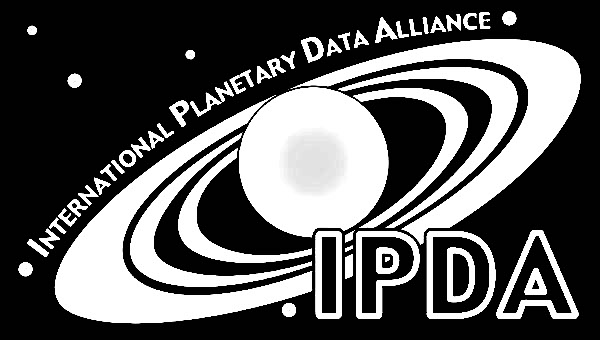The following is the official charter of the International Planetary Data Alliance. It was adopted in July 2007.
1. Mission Statement
The International Planetary Data Alliance (IPDA) is a close association of partners with the aim of improving the quality of planetary science data and services to the end users from space based instrumentation.
The specific mission of the IPDA is to facilitate global access to, and exchange of, high quality scientific data products managed across international boundaries. This will be achieved by adhering to a set of governing data standards
2. Scope
Scientific and engineering data from planetary missions originate from diverse scientific disciplines. Data are often characterized as being one of a kind, obtained by unique space instrumentation. It has always been a paradigm in the planetary community to guarantee the long-term availability of these data that are defined and captured using simple data structures and well-defined data models and data dictionaries.
The challenges in the planetary community are two-fold.
- How can simple, but efficient data exchange and access be obtained from space missions flown by different space agencies around the world?
- How does an archiving standard evolve in a world of continuous and major technological changes?
It is the belief of the IPDA partners that both challenges can be faced by a worldwide alliance focused on achieving interoperability primarily by agreeing on common data models and dictionaries. As a consequence, distributed archival systems are expected to be developed and maintained by the individual partners in a coordinated manner.
The data standards within the IPDA, including the data models and derived dictionaries, are based on the NASA Planetary Data System (PDS) that is the de-facto standard for all planetary data at the time of the IPDA founding.
The work on the data standards will not be restricted to planetary data sets only. Their use for solar system data sets in general will be encouraged, whenever possible.
IPDA will also examine possibilities of integrating data and applications from other data sources, i.e., ground-based observations, in-situ probes, numerical models, forecasts, etc.
3. Objectives
The main objective of IPDA is the enhancement of the research and exploration activities in the worldwide planetary community.
The IPDA as a whole shall propose and adopt standards for planetary science data archiving, exchange and access, and will implement accompanying tools in the areas, such as, but not restricted to:
- long-term data preservation
- data modeling
- data dictionary management
- interoperability
- data generation, validation, access and exchange
- visualization and mining
- services registry
4. Membership
The IPDA will be represented by a Steering Committee. Membership in the Steering Committee shall be comprised of representatives from any space agency, scientific research institute, university or other organization approved by the Steering Committee that indicate a willingness to participate fully in the IPDA activities and provide the commensurate level of support for defining and implementing the IPDA standards.
The Steering Committee is led by a chairperson and a deputy chairperson nominated by the Steering Committee for a maximum two years term.
The IPDA activities will be supported by Projects. The IPDA Projects are formed, and a Project Leader is nominated, by the Steering Committee.
5. Dependencies and Success
The success of the IPDA is dependent on acceptance and adoption of the products and services developed through the alliance by the stakeholders. These stakeholders cross international boundaries and include planetary scientists and engineers, data producers, data users, data curators, standards authorities and international space agencies.
The IPDA shall remain committed to keeping the stakeholders engaged to ensure that the IPDA and its products serve their needs.
6. Intellectual Property
The IPDA promotes an open working environment. Whenever possible, standards, software, protocols or any other results from IPDA working groups shall be made unencumbered by intellectual property claims.
